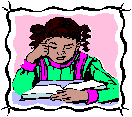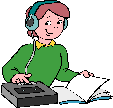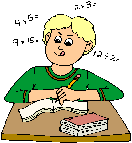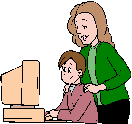LEARNING DISABILTIES Parents may be baffled when their very capable children have a great deal of difficulty learning particular skills in school. Sometimes they may suspect their children are not working hard enough, and sometimes they are correct. Children who are not learning well because of lack of effort are underachieving. Children who struggle with particular subjects despite good effort typically have learning disabilities. The three most common learning disabilities are dyslexia, dysgraphia, and dyscalculia; problems with reading and spelling (dyslexia), writing (dysgraphia), and arithmetic (dyscalculia). Ironically, early intervention is most effective, but early diagnosis is difficult. That is because there are so many individual differences in the way children learn. For example, some children may learn to read later than others but may catch up to other children very quickly. Also, to qualify for a learning disabilities program in school, children must test far below their abilities. Young children haven’t learned that much in their academic subject, so they may not score far enough behind on their tests to qualify for a program. If your children are diagnosed with learning disabilities, it’s important for you to help them feel confident in their intelligence, despite their disability. It is also important that you continue to encourage their independent homework accomplishment because they are often tempted to depend on their parents or teachers for help. TIPS TO REDUCING READING PROBLEMS Children should not be forced to read aloud to their parents at home because the parents’ anxieties about their children’s reading may be conveyed to the children. Most parents feel tense when poor readers read aloud to them. As adult readers, they will rarely find oral reading important. Children may, of course, read aloud if they choose to do so. Children should be permitted to stay up half an hour later at night if they’re in their beds reading to themselves (children often don’t like to sleep; it’s their parents who do).
Encourage children to read stories while listening to tapes or CD’s of the stories. Don’t hover over them to be sure they’re actually reading—they will eventually. Model reading by keeping a book around that your children see you enjoying. Newspapers and magazines will also serve well. Encourage children to read to younger children, provided those children aren’t better readers than they are. They shouldn’t do this in their parents’ presence, but alone with their siblings or younger friends. Visit and browse through bookstores and libraries in your travels or on shopping trips. Limit screen time. If this becomes a power struggle, you may find a plug lockvery effective.1 If that yields no explanation, you may want to have your children evaluated for a specific reading disability called Scotopic Sensitivity Syndrome.2 If your children continue to require assistance in understanding assignments, record the instructions and let them listen while they’re reading them. Content area textbooks, such as social studies or science, should be available to your children on tapes or CD’s for simultaneous listening while reading. Don’t assume your children are less intelligent because they don’t read well. Many poor readers have average, above-average, and even gifted abilities. (See NAGC Position Paper on Gifted Children with Learning Disabilities on this page.) Encourage your children to become involved in drama or speech. Memorizing lines will build their confidence. Be patient and supportive. If your children continue to read in an unpressured way, they will eventually learn to love reading. TIPS FOR IMPROVING LISTENING SKILLS3
Here are some listening suggestions that may help your children process auditory verbal stimuli better:
TIPS FOR MATH AND PERCEPTUAL DISABILITIES When I explain the mathematics concept to the students, they seem to catch on to the explanation. However, two hours later they no longer seem to understand it, almost as if I had never taught it. One can't predict whether the student will continue to have problems in math or whether the problem is related only to memory. The serious concern related to an inability to learn basic math facts is that children lose confidence in their capacity to do all math. That's the advantage of identifying the real root of the problem. If memory is the issue, an emphasis on concrete counting techniques such as tokens and use of calculators and computers can permit them to function well in math class. If mathematical concepts are difficult for the child to understand, real-life shopping or work problems will help them to concretize abstract concepts.
Your children may require tutoring for many years if they continue to struggle with math. This disability may cause children to lose some self-confidence. Because the problem seems to be at least partially genetic, you can't expect to completely change it but only to improve it somewhat with practice or by making creative adjustments when required.
Many children who begin with early problems become excellent students. The best known learning-disabled child was Albert Einstein. TIPS FOR "PENCIL" ANXIETY3 If your children write slowly and, therefore, hate writing, they can overcome this problem. Many elementary school-age children have uneven development in that the small muscle coordination needed for printing and writing seems to develop more slowly than other thinking and learning abilities. This seems to be a more frequent problem for boys than for girls. (Surprisingly, it has no effect on their use of screwdrivers, Legos, or computer games.) Here are some general suggestions that may help your children who have "pencil anxiety." Occupational Therapy is often helpful, especially for young children. Ask your child to talk her story into a microphone before actually writing it. It will permit her to get her ideas out. Permit your child to use fine-line markers or number 2 pencils for assignments, whichever seem to work better. Children who write slowly may not score up to their ability on timed tests. Time limits may have to be extended. The WISC-IV test provides a measure of Processing Speed to alert parents and teachers if there is a writing speed problem. Change expectations by making specific comments that emphasize that intelligence and speed are not the same. Some examples of things you can say follow:
STUDENTS WITH CONCOMITANT GIFED AND LEARNING DISABILITIES Due to a specific learning disability, an increasing number of students are not achieving to their potential despite the fact that they demonstrate ability or gifted behavior. These students exhibit characteristics of both: giftedness and learning disabilities. Their gifted behaviors often include keen interests, high levels of creativity, superior abilities in abstract thinking and problem-solving prowess. Similar to their peers with learning disabilities, they frequently display problems in one or more of the following: reading, writing, mathematics, memory, organization or sustaining attention. NAGC recognizes three types of students who could be identified as gifted learning disabled: (1) identified gifted students who have subtle learning disabilities, (2) students with a learning disability but whose gift has not been identified and (3) unidentified students whose gifts and disabilities may be masked by average school achievement. School policies concerning identification and entitlement to specialized educational services can contribute to the under-identification and inappropriate programming for these youngsters. Given that gifted learning disabled students do not necessarily perform below grade level, discrepancy analysis should be based on their potential compared to their classroom performance. Identifying students’ abilities and gifts should be based neither on classroom performance nor on total test scores in achievement or intelligence. Rather, to identify students’ gifts, schools should analyze individual subtest scores and patterns on tests of intelligence as well as emphasize authentic assessment of talent within specific domains using student products, audition and interviews. Students who have both gifts and learning disabilities require a dually differentiated program: one that nurtures their gifts and talents while accommodating for learning weaknesses. Without appropriate identification and services, the gifts of these students will likely be lost. WAYS TO DISCRIMINATE BETWEEN DEPENDENCE AND DISABILITY Some children who are truly disabled have also become dependent. The key to distinguishing between disability and dependence is the children’s responses to adult support. If the children perform only with adult support when new material is presented, they are dependent whether or not there is a disability.
1If you cannot find a plug lock in your area, visit http://www.familysafemedia.com/powerstop_power_plug_lock.html for more information. ©2008 by Sylvia B. Rimm. All rights reserved. This publication, or parts thereof, may not be reproduced in any form without written permission of the author. |
©2010 by Sylvia B. Rimm. All rights reserved.
Report any problems with this site to Webmaster@sylviarimm.com

 If your children are having particular difficulties with a subject, ask their teacher to arrange for a school evaluation. Private child psychologists can also be consulted for evaluations. The school psychologist usually conducts the evaluation, although learning-disability teachers may also participate. If testing indicates that children have disabilities, schools are required to provide programs to help them with problem areas.
If your children are having particular difficulties with a subject, ask their teacher to arrange for a school evaluation. Private child psychologists can also be consulted for evaluations. The school psychologist usually conducts the evaluation, although learning-disability teachers may also participate. If testing indicates that children have disabilities, schools are required to provide programs to help them with problem areas. Adults who realize children have learning disabilities are frequently vulnerable to children’s petitions for more help than they really need. Children with learning disabilities should receive additional tutoring from a teacher qualified to teach children with disabilities. Tape recorders and computers can also aid children with some learning disabilities. Special efforts may need to be made to help learning disabled children maintain their intellectual confidence and to avoid anxiety about their disability. It’s most important for parents and children to realize that many children adjust to their learning disability with time and assistance and are not permanently disadvantaged.
Adults who realize children have learning disabilities are frequently vulnerable to children’s petitions for more help than they really need. Children with learning disabilities should receive additional tutoring from a teacher qualified to teach children with disabilities. Tape recorders and computers can also aid children with some learning disabilities. Special efforts may need to be made to help learning disabled children maintain their intellectual confidence and to avoid anxiety about their disability. It’s most important for parents and children to realize that many children adjust to their learning disability with time and assistance and are not permanently disadvantaged. Reading is a first-priority subject for comfortable learning in the classroom. For children who don’t care for reading or who struggle with learning to read, the educational process will be considerably more difficult. Special recommendations for children with reading problems will help parents and teachers guide children toward self-confidence and independence despite their reading problems.
Reading is a first-priority subject for comfortable learning in the classroom. For children who don’t care for reading or who struggle with learning to read, the educational process will be considerably more difficult. Special recommendations for children with reading problems will help parents and teachers guide children toward self-confidence and independence despite their reading problems. Encourage children to read whatever they like during that pre-bedtime. Don’t insist they read grade-level material. Comics, cartoons, sports magazines, easy material, and books read multiple times are all good for reading enjoyment. If they love reading, they will expand their interests as their reading improves.
Encourage children to read whatever they like during that pre-bedtime. Don’t insist they read grade-level material. Comics, cartoons, sports magazines, easy material, and books read multiple times are all good for reading enjoyment. If they love reading, they will expand their interests as their reading improves.  If your children are having serious reading problems, ask your school psychologist or private clinic to evaluate them for a reading disability.
If your children are having serious reading problems, ask your school psychologist or private clinic to evaluate them for a reading disability.  Don’t unintentionally label your children as poor readers by talking about their problems (referentially) to others within their hearing.
Don’t unintentionally label your children as poor readers by talking about their problems (referentially) to others within their hearing.  Our media-driven society has provided children screens almost since birth. Perhaps because visual stimuli are omnipresent, many children have poor auditory processing skills. Our clinical experience has found that practice with using only auditory stimuli can enhance listening skills.
Our media-driven society has provided children screens almost since birth. Perhaps because visual stimuli are omnipresent, many children have poor auditory processing skills. Our clinical experience has found that practice with using only auditory stimuli can enhance listening skills. Teachers often describe their feelings about tutoring students who have inordinate difficulty learning mathematics in this way:
Teachers often describe their feelings about tutoring students who have inordinate difficulty learning mathematics in this way: Sometimes children's early math problems are related to perceptual disabilities. Difficulty doing puzzles, telling time, counting money, understanding maps, geography, and directions, solving math story problems, geometry, and working with computers are symptomatic of perceptual problems. A school psychologist can test the student for perceptual problems.
Sometimes children's early math problems are related to perceptual disabilities. Difficulty doing puzzles, telling time, counting money, understanding maps, geography, and directions, solving math story problems, geometry, and working with computers are symptomatic of perceptual problems. A school psychologist can test the student for perceptual problems. Regardless of the cause of the math problems, most board games (especially those involving money, such as Monopoly), Chinese checkers, dominoes, card games, including War and Go Fish, checkers, chess, puzzles, video games, tangrams, Concentration, Legos, and blocks, are excellent for developing number concepts and spatial skills that contribute to better math competence.
Regardless of the cause of the math problems, most board games (especially those involving money, such as Monopoly), Chinese checkers, dominoes, card games, including War and Go Fish, checkers, chess, puzzles, video games, tangrams, Concentration, Legos, and blocks, are excellent for developing number concepts and spatial skills that contribute to better math competence. Although a lack of math skills will reduce career choices, there remain many opportunities available for verbal, young people. At some point they may have to come to terms with a serious limitation.
Although a lack of math skills will reduce career choices, there remain many opportunities available for verbal, young people. At some point they may have to come to terms with a serious limitation. Whether or not assignments are timed, these children often develop an anxiety related to written work because they may lag behind their classmates in completing assignments. They equate fast with "smart," and they search for a way to avoid feeling "dumb." They may not finish their work or do fast and careless work and make excuses about written work being boring. These easily become bad habits that may cause children to learn to dislike writing and to develop anxieties about written assignments.
Whether or not assignments are timed, these children often develop an anxiety related to written work because they may lag behind their classmates in completing assignments. They equate fast with "smart," and they search for a way to avoid feeling "dumb." They may not finish their work or do fast and careless work and make excuses about written work being boring. These easily become bad habits that may cause children to learn to dislike writing and to develop anxieties about written assignments. Encourage your child's use of the computer for all drafts when writing stories or reports.
Encourage your child's use of the computer for all drafts when writing stories or reports. Have your child practice this "speeding" exercise. It's a personal self-competition model. He can copy written material or do math facts and will need a stopwatch and multiple sheets of the same math facts or written material to copy. He first copies the material and sets a baseline time to record on a calendar. The next day he writes the same material and marks the time. The goal is to beat his own time. Writing the same material every day may get boring, but he’ll soon find he can write much faster. He’ll become much more relaxed about timed tests if timing becomes a daily habit, and he can see his improvement.
Have your child practice this "speeding" exercise. It's a personal self-competition model. He can copy written material or do math facts and will need a stopwatch and multiple sheets of the same math facts or written material to copy. He first copies the material and sets a baseline time to record on a calendar. The next day he writes the same material and marks the time. The goal is to beat his own time. Writing the same material every day may get boring, but he’ll soon find he can write much faster. He’ll become much more relaxed about timed tests if timing becomes a daily habit, and he can see his improvement.